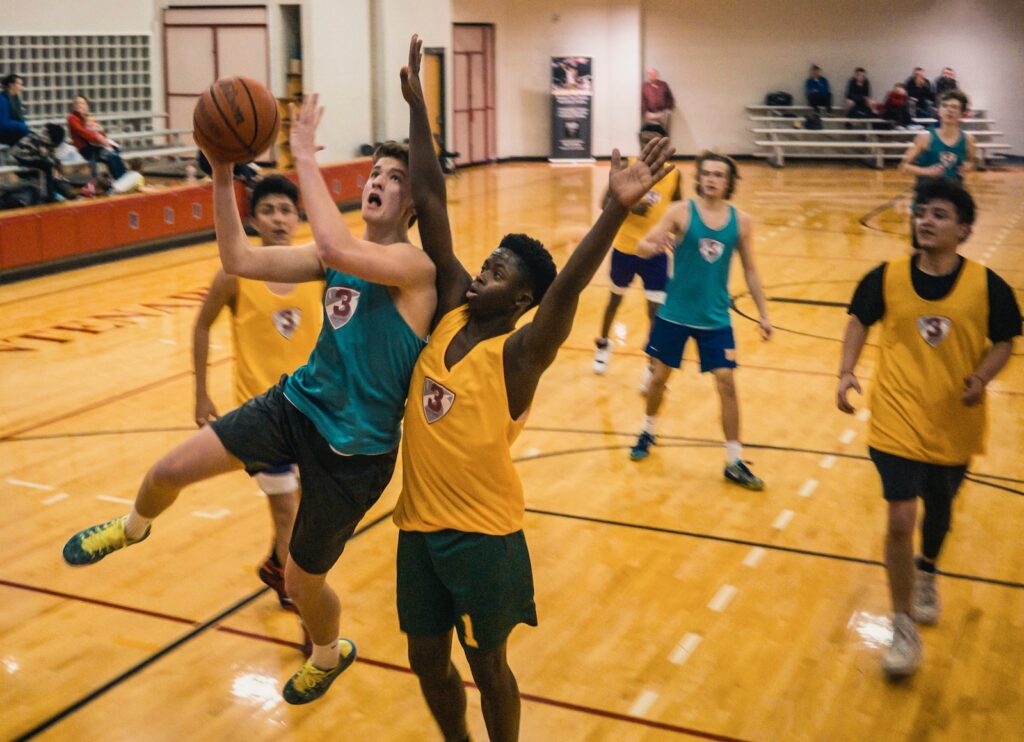This post was originally published on this site

Sports and extracurricular activities are an important part of a student’s educational experience, providing opportunities for personal growth and character development. Private schools have long recognized the value of these programs and have made them an integral part of their curriculum.
Research has shown that participating in sports and extracurricular activities can have a positive impact on a student’s academic performance, social skills, and overall well-being. These programs provide opportunities for students to develop important life skills such as teamwork, leadership, and time management, which are essential for success both in and out of the classroom.
Private schools often have a wider range of sports and extracurricular activities available to students than public schools, and they are typically better funded and better equipped to provide top-notch facilities and coaching. This allows students to explore a variety of interests and passions, from athletics to music to community service, and to develop a well-rounded set of skills and experiences that will serve them well in their future endeavors.
The Importance of Sports and Extracurricular Activities in Education
Sports and extracurricular activities play an essential role in education, particularly in private schools. These activities provide students with an opportunity to develop character and discipline outside the classroom. Research has shown that students who participate in extracurricular activities and sports tend to have better academic performance, attendance, and behavior in school.
Participation in sports and extracurricular activities helps students develop a sense of responsibility, teamwork, and leadership. These activities also promote mental alertness, self-esteem, and social self-confidence. Students who participate in sports and extracurricular activities are more likely to have a positive attitude towards school and are less likely to drop out.
In private schools, sports and extracurricular activities are an integral part of the education system. Private schools offer a wide range of extracurricular activities, including sports, music, drama, and community service. These activities provide students with an opportunity to explore their interests and talents outside the classroom.
Research has shown that participation in sports and extracurricular activities has a positive impact on students’ academic performance. Students who participate in these activities tend to have higher GPAs, better attendance records, and are more likely to graduate from high school. These activities also promote critical thinking and problem-solving skills, which are essential for success in the classroom and beyond.
In conclusion, sports and extracurricular activities are crucial components of education, particularly in private schools. These activities provide students with an opportunity to develop character, discipline, and leadership skills. Participation in sports and extracurricular activities has a positive impact on academic performance, attendance, and behavior in school. Private schools offer a wide range of extracurricular activities, providing students with an opportunity to explore their interests and talents outside the classroom.
The Role of Private Schools in Promoting Sports and Extracurricular Activities
Private schools play a significant role in promoting sports and extracurricular activities among students. These schools recognize that sports and extracurricular activities are essential in building character and discipline in students. As such, they provide resources and support to ensure that students have access to a wide range of activities.
Private schools have the advantage of having more resources compared to public schools. This enables them to offer a more diverse range of sports and extracurricular activities. Schools can hire specialized coaches and teachers to provide training in various areas such as music, drama, and sports.
Administrators and staff in private schools also recognize the importance of sports and extracurricular activities in building character and discipline in students. They encourage students to participate in activities outside of the classroom and provide support in terms of resources and facilities.
Teachers play a crucial role in promoting sports and extracurricular activities in private schools. They act as mentors and coaches, helping students to develop their skills and talents. They also provide guidance and support to students, encouraging them to participate in activities that interest them.
In conclusion, private schools have a significant role to play in promoting sports and extracurricular activities among students. They recognize the importance of these activities in building character and discipline in students. Private schools provide resources and support to ensure that students have access to a wide range of activities, and teachers act as mentors and coaches to help students develop their skills and talents.
Sports in Private Schools
The Impact of Sports on Character and Discipline
Sports play a crucial role in building character and discipline in students. Private schools recognize this and offer a wide range of athletic activities to their students. Participation in sports teaches students important values such as teamwork, sportsmanship, and respect for authority. It also helps them develop resilience, perseverance, and self-discipline.
Sports can also help students learn to manage their time effectively. They must balance their academic work with their athletic activities, which can be challenging. However, when they learn to manage their time effectively, they are better prepared to handle the demands of college and the workforce.
The Diversity of Sports in Private Schools
Private schools offer a diverse range of athletic activities to their students. Some of the most popular sports include basketball, volleyball, cross country, and competitive sports teams. However, private schools also offer other athletic activities such as swimming, tennis, and golf.
Private schools recognize that not all students are interested in traditional sports. Therefore, they offer a variety of athletic activities to cater to different interests and abilities. This diversity of sports allows students to explore their interests and develop their skills in a supportive environment.
The Role of Competition in Sports
Competition is an important aspect of sports in private schools. It teaches students to respect their opponents, play fair, and strive for excellence. However, private schools also recognize that competition can be stressful for some students. Therefore, they focus on creating a supportive environment that encourages students to do their best without feeling overwhelmed.
Private schools also recognize that sports are not just about winning. They emphasize the importance of sportsmanship and encourage their students to be gracious in both victory and defeat. This focus on sportsmanship helps students develop important social skills and prepares them for success in all areas of life.

Extracurricular Activities in Private Schools
Private schools offer a wide range of extracurricular activities to their students, providing them with opportunities to explore their interests and passions beyond the classroom. These activities help students develop important life skills such as teamwork, leadership, and time management, while also building character and discipline.
Academic and Hobby Clubs
Private schools often offer a variety of academic and hobby clubs for students to join. These clubs provide students with opportunities to explore their interests and passions in areas such as math, science, music, and more. Academic clubs such as debate and math clubs can help students develop critical thinking and problem-solving skills, while hobby clubs such as photography and chess clubs can help students develop their creativity and strategic thinking.
Arts and Culture Programs
Private schools often have robust arts and culture programs, offering students opportunities to explore their artistic talents and interests. These programs can include music, theater, dance, and visual arts. Participating in these programs can help students develop their creativity, self-expression, and confidence.
Community and Service Clubs
Private schools often have community and service clubs that provide students with opportunities to give back to their communities and develop their leadership skills. These clubs may include volunteering at local organizations, participating in community service projects, and organizing fundraising events.
Student Government
Private schools often have student government organizations that allow students to have a voice in the decision-making process of their school. These organizations provide students with opportunities to develop leadership skills, teamwork, and communication skills. Student government members may organize school events, participate in school policy decisions, and represent their school in the community.
Overall, private schools offer a wide range of extracurricular activities that provide students with opportunities to explore their interests and passions, develop important life skills, and build character and discipline.
The Impact of Extracurricular Activities on Student Success
Participation in extracurricular activities is an essential aspect of a well-rounded education. Engaging in sports, clubs, and other activities outside of the classroom can help students develop character, leadership, and respect for others.
Research has shown that students who participate in extracurricular activities are more likely to have better attendance, behavior, and academic performance. A study conducted on the impact of extracurricular activities on academic achievement found that students who participated in extracurricular activities had higher GPAs, test scores, and were more likely to graduate from high school.
Extracurricular activities also provide students with the opportunity to develop important life skills such as time management, teamwork, and communication. Students who participate in sports, for example, learn how to work with others towards a common goal, how to handle pressure, and how to persevere through challenges.
In private schools, extracurricular activities are often an integral part of the educational experience. Private schools often offer a wide range of extracurricular activities, from sports to music to community service, providing students with the opportunity to explore their interests and passions.
In conclusion, extracurricular activities play a crucial role in building character and discipline in students. By providing students with opportunities to develop leadership skills, respect for others, and a well-rounded education, extracurricular activities can contribute to the success of students in school and beyond.
Challenges and Solutions in Implementing Sports and Extracurricular Activities
Private schools face various challenges when implementing sports and extracurricular activities for their students. These challenges may include:
- Costs: Private schools may have limited budgets for sports and extracurricular activities, which can make it challenging to provide equipment, transportation, and other necessary resources.
- Collaboration: Private schools may have limited opportunities to collaborate with other schools or organizations to provide a wider range of sports and extracurricular activities.
- Evaluation: It can be challenging to evaluate the effectiveness of sports and extracurricular activities in building character and discipline among students.
To address these challenges, private schools can consider the following solutions:
- Partnering with government entities: Private schools can collaborate with government entities, such as the U.S. Department of Education, to access resources and funding for sports and extracurricular activities.
- Sharing resources: Private schools can share equipment and transportation with other schools or organizations to reduce costs and provide more opportunities for their students.
- Evaluating impact: Private schools can evaluate the impact of sports and extracurricular activities on student character and discipline by collecting data and feedback from students, teachers, and parents.
Overall, private schools can overcome the challenges of implementing sports and extracurricular activities by being resourceful and collaborative while prioritizing the development of their students’ character and discipline.
Conclusion
In conclusion, private schools offer a unique environment for building character and discipline through sports and extracurricular activities. According to the search results, private schools tend to have more structured and disciplined approaches to these activities, which can help students develop key skills such as teamwork, time management, and perseverance.
Mission statements of private schools often emphasize the importance of discipline and obedience to authority, which can be reinforced through participation in sports and other activities. These schools also tend to offer strong athletic and extracurricular programs, which can provide students with opportunities to develop their skills and interests outside of the classroom.
While there is some variation among private schools in terms of their approach to sports and extracurriculars, overall, these activities can play an important role in shaping students’ character and helping them develop the skills they need to succeed in life. By providing opportunities for students to learn and grow outside of the classroom, private schools can help prepare them for the challenges they will face in the future.




